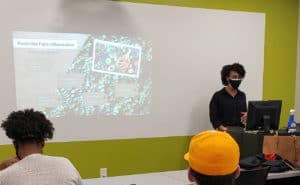
Marietta, Georgia, February 26, 2021 – The Life University (LIFE) Department of Campus Recreation and Wellness held a nutrition seminar on Thursday, February 25, 2021 to educate students, faculty and staff about reducing inflammation in their bodies and the anti-inflammatory properties of some foods.

The event was led by Director of Campus Recreation and Wellness Danae Glanton and Nina
Caba, a student who will graduate from LIFE’s Bachelor of Science in Dietetics degree program in Spring Quarter 2021. Caba also serves as secretary of LIFE’s Food and Nutrition Club.
Founded in 1974, Life University is a health sciences institution most known for its Doctor of Chiropractic (D.C.) program, the largest single-campus chiropractic program in the world. Undergraduates can pursue 14 undergraduate degrees as well as a pre-chiropractic, degree-seeking pathway. Three graduate degrees are available, encompassing areas of sport health science, clinical nutrition and positive psychology. Some degree programs are offered to distance learners through the College of Online Education.
Through its Division of Sport Health Science, LIFE offers five different nutrition and dietetics programs: Bachelor of Science degrees in Culinary Nutrition, Dietetics and Nutrition, a Master of Science degree in Clinical Nutrition and a postbaccalaureate Dietetics Internship, which is one of the top-rated programs of its kind in Georgia and the United States. LIFE’s Nutrition Department boasts six state-of-the-art teaching kitchens where students receive hands-on training and group learning in addition to a live demonstration culinary amphitheater, where instructors model concepts taught in class.
When she began her position at LIFE in the fall of 2020, Glanton made it a priority to speak with students about the kinds of wellness programs that they would like the University to offer.

“Wellness is happening across campus already, so I asked, ‘What could Campus Rec do to continue, to contribute and to build on that?’ Some of the things that students requested were nutrition-related programs,” Glanton said. “Life University students are busy people, so if I was going to ask them to come and spend 45 minutes or an hour with us, I wanted it to have a richness to it that was something that they needed.”
Caba agreed that students are seeking a better balance in their lives. “We struggle with sleep, we struggle with nutrition and just our overall wellbeing. The pandemic is another stress factor that adds to the equation,” she said. “Inflammation is a big thing, and we can get it from stress, lack of sleep and the wrong foods. I wanted to focus on that and how inflammation plays a role in health overall.”
The seminar was part of a month long series throughout February about the different relationships individuals have – with themselves, with others and with food – and how those relationships impact people’s lives. Both Glanton and Caba emphasized that building awareness and increasing knowledge were key goals of the most recent event.
“The right foods can be advocates for us. They’re going to protect us. And there are foods that are going to be against us,” Caba explained. “I want people to learn the mechanisms of how those foods fight for us and to understand how easy and doable it is, just having a ratio where healthier foods are higher.”
“You can make small choices that may have a big impact on your overall health,” Glanton added.
The annual Life University Nutrition Fair will take place in March to coincide with the Academy of Nutrition and Dietetics’ National Nutrition Month. With the theme “Personalize Your Plate,” the Nutrition Fair will be fully online for the first time ever, due to current physical distancing limitations on campus.
“Being informed is important. We may think we’re buying something healthy, and it’s really not,” Caba said. “I would like students to feel inspired and encouraged to be healthy and to make sure they have their wellbeing as a top priority.”
The Department of Campus Recreation and Wellness is also planning programs that will focus on nutrition, overall health and other wellness strategies. A series of cooking demonstrations during the month of March will explore specific dishes from around the world along with their cultural context.
While attendance is currently limited to LIFE students, faculty and staff, Glanton said she hopes to be able to invite the public to participate in the future. She also encouraged members of the LIFE community to partner with the department with ideas for additional programs and opportunities to lead.
Life University strives to empower its students to succeed both professionally and personally. LIFE advances a leading-edge approach to higher education while also remaining true to the University’s philosophical commitment to produce informed leaders who exemplify humanistic values in their professions. To achieve this goal, LIFE recognizes and demonstrates its dedication through three official Life University Values: Lasting Purpose, Vitalism and Integrity.
LIFE’s 110-acre campus in Marietta, Georgia, just northwest of Atlanta, is home to more than 2,700 undergraduate, graduate and professional students who come from all 50 United States and more than 45 countries.
For additional details about the Life University Division of Sport Health Science, including each of LIFE’s nutrition and dietetics programs, please click here.
For more information about Life University, visit LIFE.edu.

Social Media